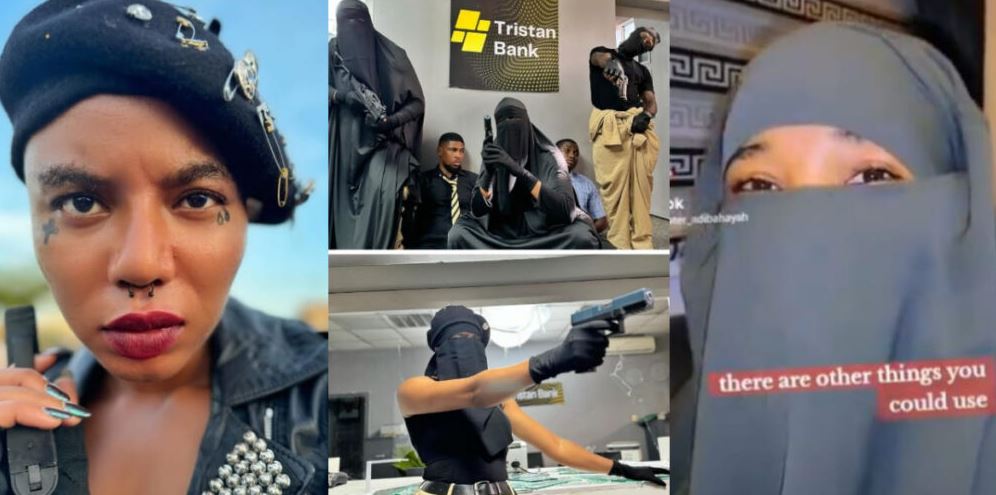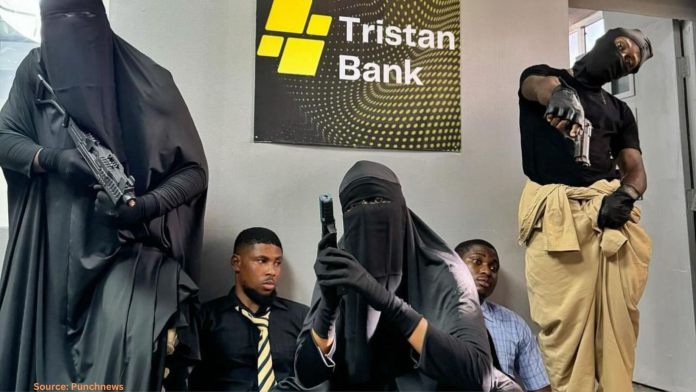- Actress Nancy Isime’s Film Uses Niqab for Robbery Scene. Adiba Hayah criticized Isime, stating that the niqab is a symbol of faith.
- The Muslim Rights Concern (MURIC) has called for a ban on the film, labeling it as promoting Islamophobia.
- The incident raises questions about the portrayal of religious attire in media and the responsibility of filmmakers to represent cultures respectfully.
Newsypeople – In a recent controversy that has stirred social media, Nigerian actress Nancy Isime is facing backlash for her portrayal of a robbery scene in an upcoming film while wearing a niqab.
The uproar began with a TikTok video by Adiba Hayah, a Muslim woman, who expressed her anger over the use of Islamic attire in what she considered a disrespectful context. This incident has sparked a broader discussion about how Muslim women are represented in media and the implications of using religious garments as props in entertainment.

Wiki And Bio
|
Detail |
Information |
|
Name |
Adiba Hayah |
|
Profession |
Activist, Social Media Influencer |
|
Nationality |
Nigerian |
|
Notable Work |
Critique of media portrayals of Muslim women |
|
Social Media |
Active on TikTok and other platforms |
The Controversy Unfolds
Nancy Isime shared images from her film project, Blood Brothers, on Instagram, showing herself and other actresses in niqabs while brandishing firearms. This depiction, especially in a robbery context, has drawn significant criticism from the Muslim community. Adiba Hayah, speaking on TikTok, emphasized that the niqab is a symbol of faith and modesty, not just a costume. She stated,
“Niqob is not a costume; you do not use it to represent things that are unspeakable in society.”
Adiba’s comments resonated with many, who feel that such portrayals perpetuate negative stereotypes about Muslim women. She argued that using the hijab or niqab in a criminal context disrespects Islamic values and exacerbates the challenges faced by Muslims in Nigeria, where tribal conflicts and religious intolerance are common.
Lady calls out Nollywood and Nollywood actress Nancy Isime for using the Niqob to act a rob#bery scene in an upcoming movie. pic.twitter.com/SXqeeCPO3Q
— Hausa Room (@HausaRoom) July 24, 2024
Community Reactions
The backlash extends beyond Adiba’s video. The Muslim Rights Concern (MURIC) has called for a ban on the film, labeling it “satanic” and accusing it of inciting public animosity against Muslim women. They argue that depicting women in hijabs as criminals is an act of Islamophobia and a deliberate attempt to tarnish the image of Muslim women.
Social media users have also voiced their dissatisfaction. Comments on various platforms reflect a shared sentiment that the niqab should not be associated with criminality.

One user remarked, “The niqab/hijab is not an armed robbery attire! The niqab/hijab is not an attire for concealing identity.” This sentiment underscores broader concerns about the implications of such portrayals in popular culture.
The Significance of the Niqab
The niqab, a face veil worn by some Muslim women, is often misunderstood in popular culture. For many, it represents a commitment to their faith and a symbol of modesty. Adiba Hayah articulated this, stating,
“This is not another costume or fashion attire; it is an identity, a symbol of modesty, and a representation of somebody’s faith.”
The controversy surrounding Nancy Isime’s film highlights important questions about cultural sensitivity and the responsibility of filmmakers to portray diverse communities accurately and respectfully. As the discussion continues, it is evident that the portrayal of Muslim women in media must be approached with care to avoid reinforcing harmful stereotypes.
Frequently Asked Questions (FAQ)
Q: What sparked the controversy involving Nancy Isime?
A: The controversy arose from Nancy Isime’s portrayal of a robbery scene in her upcoming film while wearing a niqab, which many in the Muslim community found disrespectful.
Q: Who is Adiba Hayah?
A: Adiba Hayah is a Muslim woman who criticized Nancy Isime for using the niqab inappropriately in a film context, emphasizing that it is not a costume but a symbol of faith.
Q: What actions have been taken by the Muslim community in response?
A: The Muslim Rights Concern (MURIC) has called for a ban on the film, and many community members have expressed their outrage on social media, urging for greater sensitivity in media portrayals of Muslim women.
Also Read: “N200 is Insulting!” – Saida Boj Challenges Men to Raise Their Game in Nightclubs



